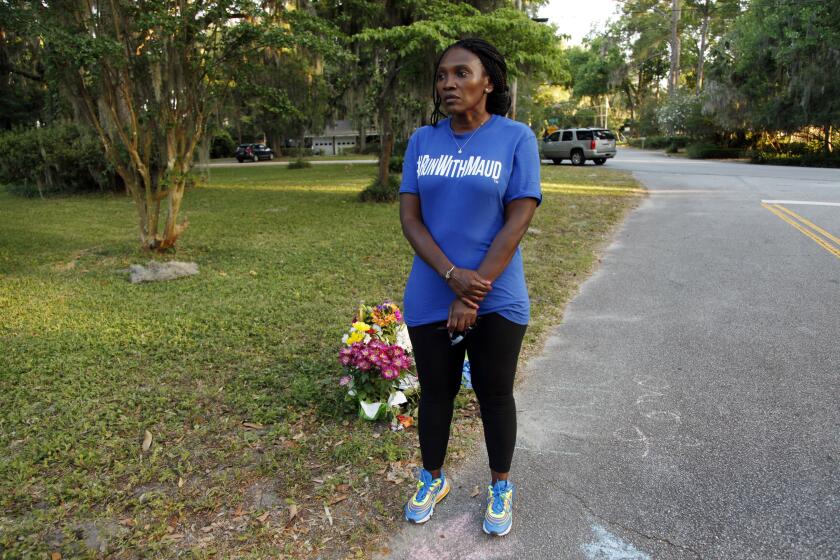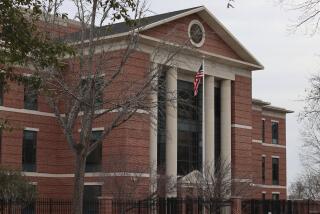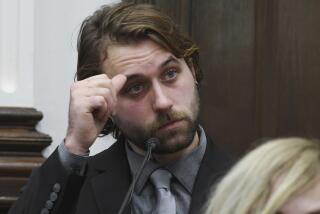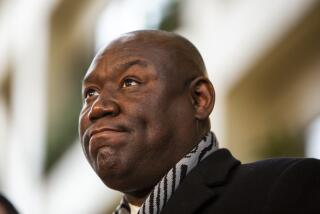Jury begins deliberations in Kyle Rittenhouse murder trial
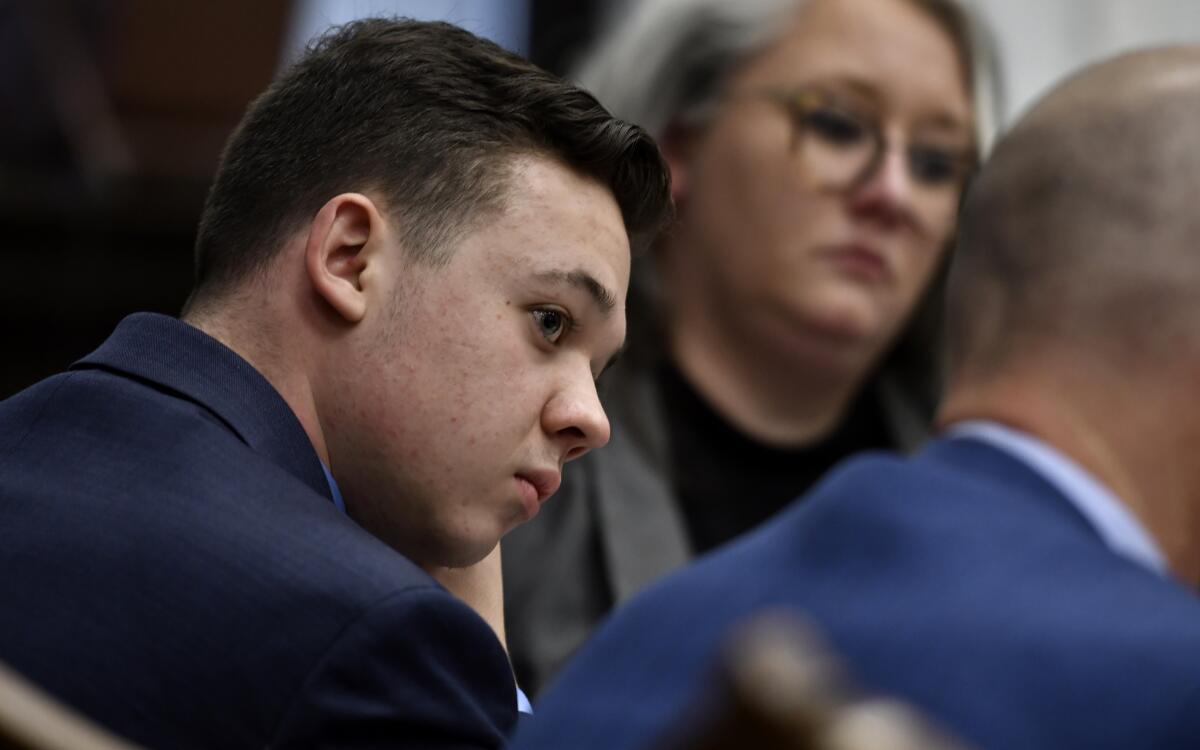
KENOSHA, Wis. â Jurors in the murder trial of Kyle Rittenhouse began deliberations Tuesday in a case that has become a touchstone on the issues of gun rights, vigilantism and law and order following months of racial justice protests across the country.
Rittenhouse was 17 and armed with an AR-15-style rifle when he shot and killed two men and wounded another as protests and riots against police brutality swept through Kenosha on Aug. 25, 2020. The teenager with the pudgy face and close-cropped hair was suddenly drawn into a national debate.
In the charged politics of the Trump era, the right quickly embraced Rittenhouse â who had traveled from his home in Illinois â as a hero who was helping authorities restore order. The left says he was a provocateur searching for violence.
Twelve jurors will consider a much narrower question: Was he acting in self-defense each time he pulled the trigger?
âThe defendant provokes the incident,â Assistant Dist. Atty. Thomas Binger told jurors during closing arguments Monday, asking them to think back on the video theyâd watched of the moments before Rittenhouse shot 36-year-old Joseph Rosenbaum.
Itâs boggling how racists can engineer a situation in which a Black man dies, then claim they had to kill him.
But Rittenhouseâs defense attorney, Mark Richards, said that Rosenbaum was the aggressor and that the evidence had shown he was âleapingâ and âlungingâ at the defendant and that his âhand was on the gun.â
âThis has been a rush to judgment,â Richards said.
Now 18, Rittenhouse, dressed in a blue shirt and tie, occasionally yawned as he listened.
If convicted of first-degree intentional homicide, he could spend the rest of his life in prison. The other charges against him include first-degree reckless homicide and first-degree recklessly endangering safety.
He was also facing a misdemeanor charge for illegally carrying a weapon â the charge that legal experts had said was the most likely to result in a conviction. Wisconsin generally bans anyone under 18 from possessing a gun.
But just before closing arguments, Judge Bruce Schroeder discarded that charge, ruling that the Wisconsin law is unclear and can be interpreted to mean that 17-year-olds are allowed to openly carry firearms that are not short-barrel rifles.
Outside the Kenosha County Courthouse on Monday, throngs of television cameras lined a grassy area. A man paced back and forth carrying a Blue Lives Matter flag.
âSelf-defense is not a crime,â he said, declining to give his name. âKyle Rittenhouse is innocent.â
A few feet away, another man stood next to a cardboard cutout of Rittenhouse wearing a T-shirt that read âKonvict Killer Kyle.â
âJustice is what we want!â he shouted into a megaphone.
The protests here in August of 2020 came after Rusten Sheskey, a white Kenosha police officer, shot and paralyzed a Black man, Jacob Blake, after being called to an apartment complex for a domestic violence dispute.
Blake, who was holding a knife when he was struck by several bullets, later pleaded guilty to two misdemeanor counts of disorderly conduct. Sheskey was cleared in an investigation and remains in the department.
Days after the shooting, federal law enforcement and National Guard troops were dispatched across the city for several weeks to deter protesters and protect property.
During the trial, Rittenhouse testified that he went to Kenosha to protect property and provide medical treatment.
Video presented in court shows Rosenbaum chasing Rittenhouse through a parking lot before Rittenhouse shoots him.
The second man he killed, 26-year-old Anthony Huber, can be seen swinging a skateboard at his head before attempting to grab Rittenhouseâs rifle. Moments later Rittenhouse fires a single shot that hits Gaige Grosskreutz, 27, in the arm. Grosskreutz was carrying a handgun.
For more than two weeks, attorneys on both sides of the aisle have called dozens of witnesses. Rittenhouse took the stand, often sobbing as he said that he had feared for his life. At one point, he said he âdidnât want to have to shootâ Rosenbaum.
âI didnât do anything wrong,â he said. âI defended myself.â
The trial has deeply divided Kenosha, a town of 100,000 tucked along the shores of Lake Michigan.
As he watched the trial from his home in Pleasant Prairie, seven miles west of Kenosha, Tim Pinter said he was âdisgusted by what Rittenhouse had done.â
Still, he said, âI hope he gets off on the worst of the charges.â
âHeâs foolish,â said Pinter, 48, who owns a construction company and had spent two nights last year guarding his own subdivision with a semiautomatic rifle, in fear that the riots might make it to his neighborhood.
Pinter said he understood Rittenhouseâs stated goal to patrol with a gun to protect property. What he didnât understand was why a 17-year-old from a different state would come to his city.
âHeâs guilty of bad judgement,â Pinter said. âHe put himself in the wrong place at the wrong time with probably the right motives. But he doesnât deserve to go to prison for the rest of his life. Heâs already paid a very dear price for what heâs done.â
Last year, the shopping centers a few blocks from Pinterâs home were full of boarded-up windows and doors. This week, he said, things felt normal, and he had no plans to stand in front of his neighborhood with a gun no matter the outcome of the trial.
âHis victims were white,â Pinter said. âIf they were Black, I think things would be different.â
Alvin Owens, who owns a barbershop and community center just a few blocks from where the homicides occurred, said he also saw a racial element in the trial and its possible outcome.
âI donât have any faith in the system,â said Owens, 53, who is Black. âThe justice system has failed our community over and over again.â
âHeâs going to be found not guilty. And, yes, being white is part of that. If he is found guilty, I donât think the sentence will be enough,â he said.
He said he thought the judge in the case was biased.
âHis phone went off during the trial with the Trump theme,â Owens said, referencing the ringtone of âGod Bless the U.S.A.,â a song by Lee Greenwood that has been used by the former president at rallies.
Owens, who was tear-gassed last year as he marched in rallies after police shot Blake, said he understood why people wanted to come out to protect their communities last summer. To him, Rittenhouse wasnât one of those people.
âWe were all out protecting ourselves. We just didnât all have guns.â
With millions across the U.S. watching and reading about the events in his hometown, Owens said he hoped people would take away something beyond the trial.
âI want people to stop politicizing our city,â he said. âWe are not red. We are not blue. We are America. Our demographics, our political breakdown, matches that of the country overall. Weâre a great place and weâre working through some dark times. We want to get past this chapter.â
Lee reported from Kenosha and Kaleem from Los Angeles.
More to Read
Sign up for Essential California
The most important California stories and recommendations in your inbox every morning.
You may occasionally receive promotional content from the Los Angeles Times.
